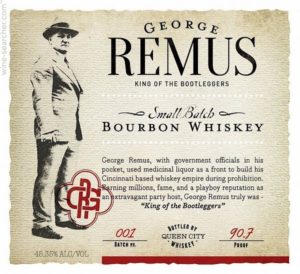George Remus Biography
By Richard Thomas
Although not as famous as Al Capone or Dutch Schultz, if you want to know the intimate story of Kentucky whiskey bootlegging, George Remus is the name you need to know. A successful criminal defense attorney from Cincinnati, Ohio, Remus turned to Prohibition era bootlegging when he saw the money to be made there, and in his day was so infamous as to become the inspiration for the title character in F. Scott Fitzgerald’s landmark The Great Gatsby.
Remus was born in German in 1874 and followed his family to America, settling in Cincinnati like so many other German immigrants of the day. He was certified as a pharmacist at 19 years of age and became a successful druggist, running two stores, but became bored with his trade and business. He decided to study law in Illinois, and passed the Bar there in 1904.
Remus practiced criminal law, and became a highly successful defense attorney. By 1920, his income was $50,000, and this was at a time when the medium income was just $1,200. In a move that later came back to haunt him, it was in this era when he was a well-heeled attorney at the dawn of the Roaring Twenties that Remus divorced his wife of two decades and ran off with his secretary and mistress, Augusta Imogene Holmes.
In his role as a defense attorney, Remus found himself defending bootleggers from the very beginning of the Prohibition era, and he instantly noted just how much those bootleggers were able to spend on their legal defense. Applying his expertise, Remus studied the loopholes in the Volstead Act, the legislation that enabled the 18th Amendment prohibiting the manufacture and sale of alcohol with criminal penalties.
Remus left Chicago, returned to Cincinnati, and used his considerable financial resources to buy up distilleries and other stocks of liquor, particularly across the Ohio River in neighboring Kentucky. For example, Remus bought stocks of whiskey from the Pogue Distillery in Maysville, Kentucky, although he did not acquire the distillery itself in that instance. Remus would then arrange for his own men to “hijack” shipments of his liquor, which he would then sell illegally.
Commanding huge stocks of aged whiskey, Remus quickly established himself as the “King of the Bootleggers,” building a multi-million dollar empire and establishing himself in a posh mansion known as the “Marble Palace.” He became famous in Cincinnati as a lavish entertainer, and at one party in 1923 he game a new Pontiac to each of some fifty female guests. Although his reign was not marked with the kind of violence seen in Chicago or New York during the same era, it did not go unmarked by scrapes with rivals that sometimes included gun battles and murder.
Yet Remus was not as clever a lawyer as he thought, and his tenure as the chief bootlegger of the Ohio River Valley came to an end in 1925. Convicted on Volstead Act violations, he was sentenced to two years in a Federal prison.
This is when Remus’s philandering and taste in women did him in. Upon learning that Remus’s wife had effective control of his financial empire, Prohibition agent Franklin Dodge hooked up with Augusta Imogene Remus, and the pair liquidated Remus’s holdings and absconded with the money. When Remus emerged from prison, he returned to a house stripped bare of even most of its fittings, and his criminal business was gone.
Remus’s wife finally divorced him in 1927, but he was a free man by then. On the way to court for the divorce hearing, Remus ordered his car to chase Imogene down and run her off the road, whereupon Remus shot her to death before their daughter, right in front of Cincinnati’s Spring House Gazebo.

(Credit: Queen City Whiskey)
Remus was promptly arrested, and drew for a prosecutor none other than Charles P. Taft II, son of the former President and sitting Chief Justice of the Supreme Court and brother of the sitting U.S. Senator. Nonetheless, his murder case came to naught; pleading temporary insanity, Remus was acquitted by the jury in just 19 minutes. In a brilliant display of chutzpah, Remus was then able to avoid being committed to a state mental institution by turning the prosecutor’s own expert witnesses (with their testimony that he was not insane) against the state.
A free man, Remus found himself unable to rebuild his bootlegging business. The wide open markets of the early days of Prohibition were a thing of the past, and his rackets had been taken over by full-fledged (and much more violent) gangsters. He was also unable to return to his previous career as a powerful defense attorney. Ultimately Remus moved across the Ohio to Covington, Kentucky, where he lived modestly for two decades until he passed away in 1952, aged 77.
George Remus figured prominently in the Ken Burns documentary series Prohibition, and was also a minor character in the HBO drama Boardwalk Empire. A modern Bourbon brand, sourced through the MGP Distillery in Indiana, is named for him, and MGP recently bought the brand and brought it home to become their own in-house product line.



